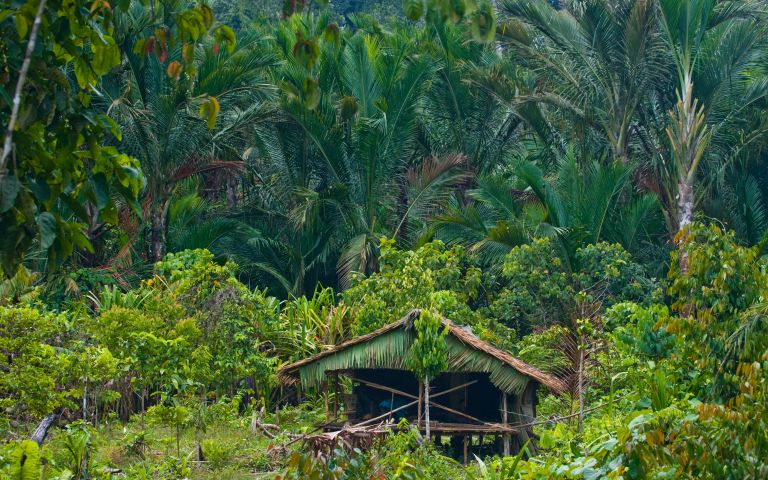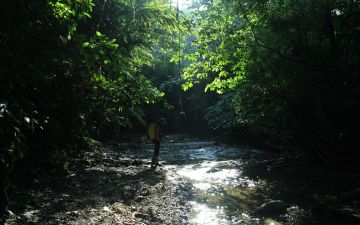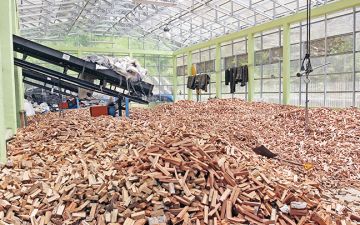Tropical rainforests on Siberut Island, Mentawai Islands, West Sumatra have long been a global concern for their uniqueness. The WWF conducted a comprehensive 1980 study with the report "Saving Siberut: A Conservation Master Plan," and UNESCO in 1981 established the 403,300 hectare island area as a biosphere reserve (Man of Biosphere). In 1993, the western part of the island, covering 190,500 hectares, was designated as Siberut National Park.
The tropical rainforest of Siberut Island has high endemism. There are four endemic primate species: Macaca pagensis (Bokoi or Pagai Macaque), Presbytis potenziani (Mentawai Langur), Hylobates klosii (Kloss’ Gibbon), and Nasalis concolor siberu (Pig Tail Langur). Experts estimated around 65 percent of mammals and 14 birds species are also endemic.
The Siberut forest is also a home to Mentawai Indigenous people who still live in customary life. Their lives depend on the forest.
Unfortunately, the Siberut forest is under threat. In 2003, the Indonesian government issued a 49,440 hectares forest logging concession that spreads across the northern and western part of Siberut Island. Last year, 2019, the Ministry of Environment and Forestry issued a 19,876 hectares concession for forest plantation. The forest plantation company started cutting the old forest trees at the end of last year. The government has also declared 2,600 hectares of land and forest areas as a special economic zone for tourism.
The forest concessions, special economic zone, and small scale plantations are a big threat to the Siberut forest and its biodiversity. In the next couple of years, a high deforestation rate and environmental degradation can be expected. Climate change is another threat to Siberut. A long dry season will increase the risk of fire and lack of clean water.
The solution to this problem is still unclear amid the pull of the government interests and with the rejection of Indigenous communities and environmental activists.
This reporting includes in-depth reports focusing on:
- How to save Siberut Island
- The impact of those problems on the Mentawai Indigenous people
- The threat to the endemic species of Siberut
Hutan hujan tropis di Pulau Siberut, Kepulauan Mentawai, Sumatra Barat telah lama menjadi perhatian dunia karena keunikannya. WWF melakukan penelitian komprehensif 1980 dengan laporan “Saving Siberut: A Conservation Master Plan” dan UNESCO pada 1981 menetapkan kawasan pulau 403.300 ha itu sebagai cagar biosfer (Man of Biosphere). Pada 1993 bagian barat pulau seluas 190.500 ha ditetapkan sebagai Taman Nasional Siberut.
Hutan Pulau Siberut memiliki endemisitas yang tinggi. Terdapat empat primata endemik: bokkoi (Macaca pagensis), joja (Presbytis potenziani siberu), bilou (Hylobates klosii), dan simakobu (Nasalis concolor siberu). Diperkirakan 65 persen binatang menyusui dan 14 jenis burung adalah endemik.
Pulau Siberut juga tempat hidup masyarakat tradisional Mentawai (indigenous people) dengan kebudayaan kuno. Mereka sangat tergantung kepada hutan.
Namun hutan pulau itu terancam konsesi. Terdapat satu HPH (Hak Pengelolaan Hutan) seluas 49.440 ha di bagian utara dan barat pulau sejak 2003. Tahun lalu Kementerian Lingkungan Hidup dan Kehutanan juga mengeluarkan izin Hutan Tanaman Industri 19.876 ha. Pemerintah juga menetapkan 2.600 ha lahan dan hutan di barat daya sebagai lokasi Kawasan Ekonomi Khusus (KEK) untuk pariwisata.
Aktivitas perusahaan penebangan hutan, perkebunan skala besar, dan KEK selain mengancam biodeversiti, juga deforestasi, dan degradasi lingkungan. Solusi terhadap masalah ini masih belum jelas di tengah tarik-ulur kepentingan pemerintah dan penolakan dari masyarakat adat dan aktivis lingkungan. Saat ini kondisi di Pulau Siberut juga terancam perubahan iklim: kemarau panjang menyebabkan kebakaran ladang warga dan penduduk kesulitan air bersih. Rencana tulisan: (1) bagaimana menyelamatkan hutan Pulau Siberut; (2) dampak terhadap indigenous people Mentawai, dan; (3) ancaman terhadap endemisitas Siberut.




